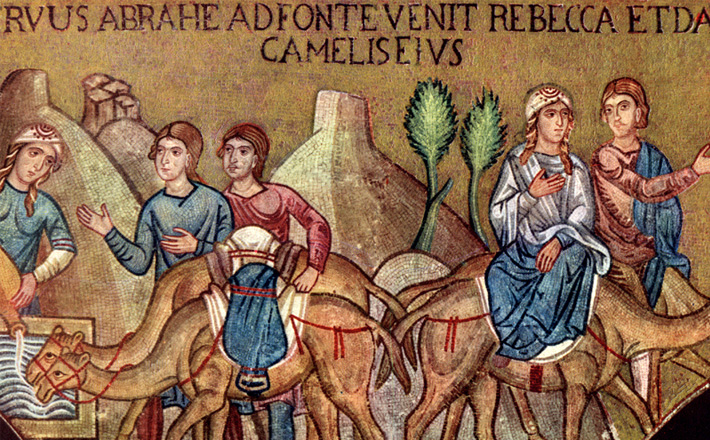Commentary on Psalm 145:8-14
Psalm 145 commands all its readers, indeed, all flesh (145:21) from every generation (145:13), to praise God the King who reigns over a universal kingdom (145:11-13) and, in so doing, provides us with a characterization of the kingdom and its king (145:8-20) in acrostic form.
The psalm, then, which effectively concludes the body of the Psalter and serves as an introduction to the final Hallelujah psalms (Psalms 146-150), may be read as a denouement of the Psalter and the final testament of the paradigmatic psalmist, David, who appears for the final time to lead the chorus in the praise of the one true king, his God.
“My God is the King”
From the beginning of the psalm (145:1), but especially in the middle core (145:11-13), the emphasis falls on God’s kingship. As I stated before, this is the final time in the Psalter that David appears in the superscription (“A praise of David”), and this immediately after his appearance in the previous psalm in which he refuses to take on the title of king, referring to himself by the (still exalted) title, “servant” (144:10). And if David demurs the title of king in Psalm 144, he emphatically identifies God as king at the beginning of Psalm 145: “I will exalt you, O my God, the King” (145:1, my translation).
He closes the psalm with a promise and call to praise this king: “My mouth shall proclaim the praise of the LORD, / and all flesh shall bless his holy name for ever and ever” (145:21, NRSV). With this act of self-abdication and commitment to praise, David changes — within the psalmic tradition — from being the paradigmatic king to being the model psalmist. David no longer leads the army into battle but the faithful throng in praise of God who alone is king.
“The LORD is good to all”
The declaration that God is king is logically followed by an emphasis on God’s kingdom in verses 11-13, in which the word “kingdom” appears four times and reference made to God’s reign three other times. And this kingdom, in contrast to the parochial kingdom David once ruled over, is a universal and everlasting kingdom.
The psalm declares that “the LORD is good to all, / and his compassion is over all that he made” (145:9) and indicates that all are God’s subjects. Furthermore, the psalm says that God’s “kingdom is an everlasting kingdom, / and [his] dominion endures throughout all generations” (145:13). This is a bold response to a core theological question of the Psalter. For, after the events of 587 BCE, lamented in Psalm 89, whether God remains king and, if so, over what became pressing theological questions. Psalm 145, along with the rest of Books IV and V of the Psalter, provides the answer: God was, is, and will be king over all creation.
“The LORD is gracious and merciful”
The claim that God is the King over a universal and eternal kingdom raises the question: What kind of king is God? And the psalm provides answers.
The psalmist first reaches back to Exodus in order to describe God the King:
The LORD is gracious and merciful,
Slow to anger and abounding in steadfast love.
The LORD is good to all,
And his compassion is over all that he has made. (145:8-9)
The simple and attractive description of God is a citation and re-interpretation of the much-venerated Mosaic formulation from Exodus 34:6-7. Citing traditional material establishes the antiquity of this understanding of God’s character: God has been and remains gracious and merciful. But the formulation has been updated in at least two significant ways. First, all reference to sin has been elided — though the problem of sin remains and receives effective response (see 145:20b). Second, the extent of God’s compassion, that is, God’s rule, is extended beyond Israel to include “all that he has made,” as noted above.
The psalm takes up the task of describing God the King again in verse 14 and continues until verse 20. More specifically, these verses list God’s subjects who receive God’s graciousness and mercy and God’s slow anger and steadfast love. The list appropriately begins with the favored among God’s people and concludes with the disfavored, indeed, with those who are destroyed.
As stated earlier in the psalm, God embraces “all that he has made”: “all [who] look to you” (145:15), “all who call on him” (145:18), “all who fear him” (145:19), and “all who love him” (145:20). But there is a group God prioritizes over all others in the kingdom so appears as first among equals in the list:
The LORD upholds all who are falling,
And raises up all who are bowed down. (145:14)
There is, in the kingdom of God, a preferential option for the lowly. God attends to the vulnerable and the downtrodden with special care and concern.
Furthest removed from the exalted lowly are the wicked, the object of God’s slow anger: “but all the wicked he will destroy” (145:20b). God’s kingdom is for all. But, in order for it to be for all, ironically, the wicked must be excluded. That they appear last in the list, farthest from the “falling” and “all who are bowed down” may be God’s gracious decision to move God’s favored as far as is possible from those who previously had abused and oppressed them. The act of receiving the lowly includes the rejection of their oppressors. The destruction of the wicked too is a necessary expression of God’s grace and mercy.
Therefore, hallelujah!
The conclusion of the alphabetic acrostic that details from A to Z the praiseworthy character of God the King appropriately concludes with a commitment and a call to praise by its head cantor, David:
My mouth will speak the praise of the LORD,
And all flesh will bless his holy name forever and ever. (145:21)
The final verse is a fitting testament of David the psalmist. And, in response, the heavens and the earth, the sea, all flesh, indeed, all that has breath raise their voices in Psalms 146-150 with the festal shout:
Hallelujah!


July 9, 2017